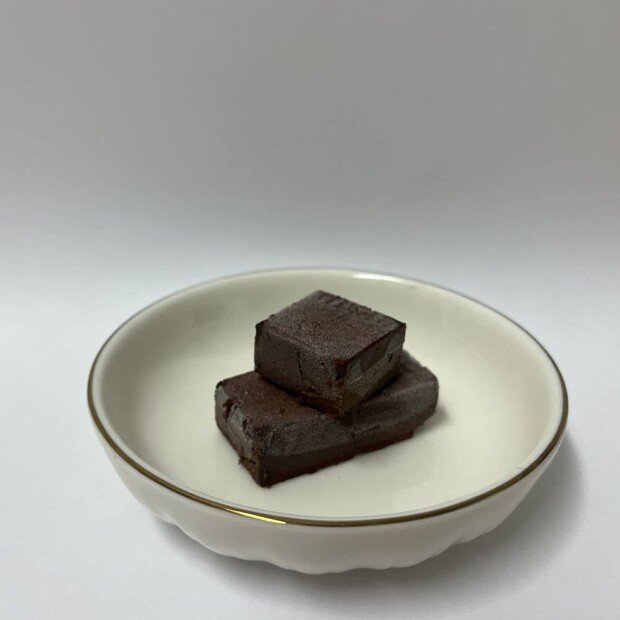Food industry, "HN Novatech's alternative cacao is expected to be a breakthrough in raw material shortages"
Food industry, "HN Novatech's alternative cacao is expected to be a breakthrough in raw material shortages"
Posted May. 24, 2024 09:13,
Updated May. 24, 2024 09:13
Cocoa prices are going high. This is due to the poor harvest in West Africa, which accounts for 70% of the total cacao production due to abnormal weather. In March, the price of cocoa futures for May surpassed $10,000 per ton for the first time in history. Bloomberg News diagnoses that "the era of cheap chocolate is over."
 Chocolate sample made of alternative cacao / HN Novatech
Chocolate sample made of alternative cacao / HN Novatech
Against this backdrop, companies dealing with cacao as their raw material are deeply concerned. They can't afford it without raising the price of the product. Unlike large companies that can afford it, small companies are simply screaming.
Chun Jong-kyu, director of the Korea Food Trade Association, who listens closely to these companies, believes that alternative cacao can be a counterplan. Just as alternative materials made of vegetable protein partially replace meat demand, alternative materials that can replace cacao can be an alternative. So we met Mr. Chun and heard about it.
The Korea Food Trade Association plays a role in discovering good products for local small/medium-sized companies and helping them distribute and export their products overseas. Mr. Chun said, "CEOs who run agricultural and food-related companies are willing to enter overseas markets but often lack practical experience or knowledge. Most of them are small businesses or family management. So we're also running a trade college that provides basic trade education for them."
 Chun Jong-kyu director / The Korea Food Trade Association
Chun Jong-kyu director / The Korea Food Trade Association
One of the companies that Mr. Chun has been associated with while working for the association is the Saeoreum Farming Association Corporation located in Jeju Island. Under the brand 'Green Pebble', the Saeoreum Farming Association Corporation is introducing foods such as tea and chocolate using 'Seokchangpo(Acoris gramineus solander) ', a medicinal herb from Jeju. As chocolate is one of their main products, Green Pebble is also suffering from the high price of cacao.
Then Mr. Chun came to mind at HN Novatech, an alternative food company. HN Novatech has been developing 'ECAO' since last year, an alternative cacao material, at the request of global food companies. The sample development has been completed and the remaining price is under discussion with global companies.
Chun said, "I learned of HN Novatech for the first time, when they participated in last year's product evaluation. At that time, I tried HN Novatech's plant-based meat substitute and thought it was so perfect that if I didn't know it was meat substitute, they wouldn't even notice it. I contacted them to see if a company with this technology could develop a material to replace cacao, and I found out that they are already developing alternative cacao."
And he said, "When I tasted HN Novatech's alternative cacao sample, I felt that it was better than similar to the existing chocolate. The texture is somewhat different, so the likes and dislikes will differ depending on the taste, but there will be enough marketability, I thought."
Saeoreum Farming Association Corporation, which learned of the existence of alternative cacao, is currently receiving samples from HN Novatech and conducting tests. Mr. Chun said, "Japanese companies are also showing a lot of interest in alternative cacao."
Chun explained that as the alternative cacao is expected to be supplied at a lower price than the current cacao price, it is an attractive alternative in terms of cost as long as the high price of cacao continues.
He said, "The current cacao problem can not be improved in a short period of time because of the impact of climate change. On the contrary, it is more likely to be worse than now. If cacao production continues to decrease in the future, supply price will continue to skyrocket. Can companies that aim to pursue profits continue to insist on cacao? If the flavor, functionality, and benefits of alternative cacao are acceptable, there is no reason not to use them."
Mr. Chun predicted that creating specialized products using alternative cacao will also be competitive in the global market. "Unlike cacao, which relies on imports, alternative cacao can also be produced with domestic materials, which could also help grow the national economy," he said.
He also predicted that not only alternative cacao but also the entire alternative food will continue to grow. "In addition to cacao, there are many crops with unstable supply and demand due to climate change. With the recent international situation where wars are frequent, there is also a phenomenon where powerful countries are weaponizing resources, including food," he said. "Eco-friendly alternative foods that have the taste and texture to replace the original and realize carbon neutrality will continue to grow."
BY Kwon Taek-Kyeong (tk@itdonga.com)

Against this backdrop, companies dealing with cacao as their raw material are deeply concerned. They can't afford it without raising the price of the product. Unlike large companies that can afford it, small companies are simply screaming.
Chun Jong-kyu, director of the Korea Food Trade Association, who listens closely to these companies, believes that alternative cacao can be a counterplan. Just as alternative materials made of vegetable protein partially replace meat demand, alternative materials that can replace cacao can be an alternative. So we met Mr. Chun and heard about it.
The Korea Food Trade Association plays a role in discovering good products for local small/medium-sized companies and helping them distribute and export their products overseas. Mr. Chun said, "CEOs who run agricultural and food-related companies are willing to enter overseas markets but often lack practical experience or knowledge. Most of them are small businesses or family management. So we're also running a trade college that provides basic trade education for them."

One of the companies that Mr. Chun has been associated with while working for the association is the Saeoreum Farming Association Corporation located in Jeju Island. Under the brand 'Green Pebble', the Saeoreum Farming Association Corporation is introducing foods such as tea and chocolate using 'Seokchangpo(Acoris gramineus solander) ', a medicinal herb from Jeju. As chocolate is one of their main products, Green Pebble is also suffering from the high price of cacao.
Then Mr. Chun came to mind at HN Novatech, an alternative food company. HN Novatech has been developing 'ECAO' since last year, an alternative cacao material, at the request of global food companies. The sample development has been completed and the remaining price is under discussion with global companies.
Chun said, "I learned of HN Novatech for the first time, when they participated in last year's product evaluation. At that time, I tried HN Novatech's plant-based meat substitute and thought it was so perfect that if I didn't know it was meat substitute, they wouldn't even notice it. I contacted them to see if a company with this technology could develop a material to replace cacao, and I found out that they are already developing alternative cacao."
And he said, "When I tasted HN Novatech's alternative cacao sample, I felt that it was better than similar to the existing chocolate. The texture is somewhat different, so the likes and dislikes will differ depending on the taste, but there will be enough marketability, I thought."
Saeoreum Farming Association Corporation, which learned of the existence of alternative cacao, is currently receiving samples from HN Novatech and conducting tests. Mr. Chun said, "Japanese companies are also showing a lot of interest in alternative cacao."
Chun explained that as the alternative cacao is expected to be supplied at a lower price than the current cacao price, it is an attractive alternative in terms of cost as long as the high price of cacao continues.
He said, "The current cacao problem can not be improved in a short period of time because of the impact of climate change. On the contrary, it is more likely to be worse than now. If cacao production continues to decrease in the future, supply price will continue to skyrocket. Can companies that aim to pursue profits continue to insist on cacao? If the flavor, functionality, and benefits of alternative cacao are acceptable, there is no reason not to use them."
Mr. Chun predicted that creating specialized products using alternative cacao will also be competitive in the global market. "Unlike cacao, which relies on imports, alternative cacao can also be produced with domestic materials, which could also help grow the national economy," he said.
He also predicted that not only alternative cacao but also the entire alternative food will continue to grow. "In addition to cacao, there are many crops with unstable supply and demand due to climate change. With the recent international situation where wars are frequent, there is also a phenomenon where powerful countries are weaponizing resources, including food," he said. "Eco-friendly alternative foods that have the taste and texture to replace the original and realize carbon neutrality will continue to grow."
BY Kwon Taek-Kyeong (tk@itdonga.com)






